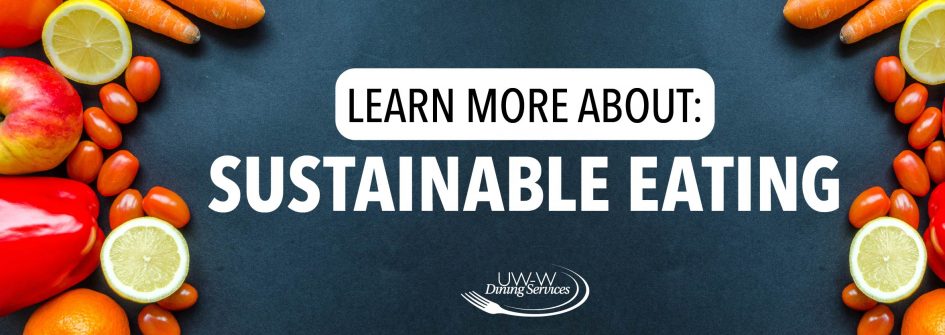During these times of chaos we are living in, our waste is increasing and paper products are being used more than ever. The planet is sadly taking a hit and this is the perfect time to focus on sustainability. One way to help our plant is to incorporate sustainable eating, but what exactly does that mean?
Sustainable food is real and natural food that our bodies were designed to be eating. It is also healthier for our bodies because it isn’t processed and sustainable food is packed with nutrients to fuel our bodies properly and keep us healthy.
Sustainable eating can incorporate many different ways of living such as using a refillable water bottle instead of purchasing bottled beverages, or incorporating meatless Mondays, or even shopping local. Farmers Markets are the best way to shop local from farmers in your area and learn about their practices.
Here are some ways you can practice sustainable eating on campus:
- Refill your water bottle using the refill stations on campus
- Eat our vegan entrees in the dining halls
- Try starting with our Meatless Monday entrée at Drumlin located on the Foundations station
- Utilize our Foundations concept at the dining hall, which focuses on healthful entrées
- Create a customizable healthful salad from Chopped at the UC
- Use a meal swipe for a healthful meal from our Good to Go program; focus on healthful choices such as salads, fruit, and vegetable cups
Have you ever tried to garden? Growing something as simple as herbs can be helpful when it comes to sustainability. Fresh herbs are easy to grow and you can grow them in your own kitchen or even your dorm room! Use them to add fresh flavor to your dinners.
Buy in-season fruits and vegetables! When fruits and vegetables are out of season they have to be shipped from far away, which has a negative impact on our environment.
Here is a list of seasons and what you can purchase in-season to help become more sustainable:
Spring
• Apples
• Apricots
• Asparagus
• Avocados
• Bananas
• Broccoli
• Cabbage
• Carrots
• Celery
• Collard Greens
• Garlic
• Kale
• Kiwifruit
• Lemons
• Lettuce
• Limes
• Mushrooms
• Onions
• Peas
• Pineapples
• Radishes
• Rhubarb
• Spinach
• Strawberries
• Swiss Chard
• Turnips
Summer
• Apples
• Apricots
• Avocados
• Bananas
• Beets
• Bell Peppers
• Blackberries
• Blueberries
• Cantaloupe
• Carrots
• Celery
• Cherries
• Corn
• Cucumbers
• Eggplant
• Garlic
• Green Beans
• Honeydew Melon
• Lemons
• Lima Beans
• Limes
• Mangos
• Okra
• Peaches
• Plums
• Raspberries
• Strawberries
• Summer Squash
• Tomatillos
• Tomatoes
• Watermelon
• Zucchini
Fall
• Apples
• Bananas
• Beets
• Bell Peppers
• Broccoli
• Brussels Sprouts
• Cabbage
• Carrots
• Cauliflower
• Celery
• Collard Greens
• Cranberries
• Garlic
• Ginger
• Grapes
• Green Beans
• Kale
• Kiwifruit
• Lemons
• Lettuce
• Limes
• Mangos
• Mushrooms
• Onions
• Parsnips
• Pears
• Peas
• Pineapples
• Potatoes
• Pumpkin
• Radishes
• Raspberries
• Rutabagas
• Spinach
• Sweet Potatoes & Yams
• Swiss Chard
• Turnips
• Winter Squash
Winter
• Apples
• Avocados
• Bananas
• Beets
• Brussels Sprouts
• Cabbage
• Carrots
• Celery
• Collard Greens
• Grapefruit
• Kale
• Kiwifruit
• Leeks
• Lemons
• Limes
• Onions
• Oranges
• Parsnips
• Pears
• Pineapples
• Potatoes
• Pumpkin
• Rutabagas
• Sweet Potatoes & Yams
• Swiss Chard
• Turnips
• Winter Squash
Source: https://www.eatright.org/health/lifestyle/culture-and-traditions/sustainable-eating
Written By: Rachael Omdoll, Campus Dietitian

Leave a Reply